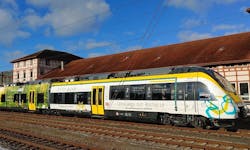Alstom and Deutsche Bahn to test Battery-powered Train on German tracks
Alstom and Deutsche Bahn will begin testing Alstom’s first fully approved battery train in Baden-Württemberg and Bavaria.
The Alstom Battery Electric Multiple Unit (BEMU) will be tested with passengers on board. The train will run on Baden-Württemberg on the Stuttgart - Horb line on weekdays and then on the Pleinfeld - Gunzenhausen line in the Franconian Lake District on weekends.
The arrangement will enable testing of the train on a variety of route profiles and battery charging scenarios. The test operation will run until May 2022.
In Baden-Württemberg, the charging will take place during the journey but in Bavaria, charging will only be possible at the electrified destination and departure stations. DB Regio will operate the train and the associated project partners are Nahverkehrsgesellschaft Baden-Württemberg (NVBW) and the Bayerische Eisenbahngesellschaft (BEG).
Alstom had developed the battery-electric train with the Technical University of Berlin. The BEMUs are designed for shorter routes or lines, which have non-electrified sections. The train was intended to be a sustainable solution for Germany’s rail network of 450 lines and the testing of these trains is a step towards the decarbonization of the vast German rail route.
This BEMU technology will later be applied to the Alstom Coradia platform.
About the Author
EnergyTech Staff
Rod Walton is head of content for EnergyTech.com. He has spent 17 years covering the energy industry as a newspaper and trade journalist.
Walton formerly was energy writer and business editor at the Tulsa World. Later, he spent six years covering the electricity power sector for Pennwell and Clarion Events. He joined Endeavor and EnergyTech in November 2021.
He can be reached at [email protected].
EnergyTech is focused on the mission critical and large-scale energy users and their sustainability and resiliency goals. These include the commercial and industrial sectors, as well as the military, universities, data centers and microgrids.
Many large-scale energy users such as Fortune 500 companies, and mission-critical users such as military bases, universities, healthcare facilities, public safety and data centers, shifting their energy priorities to reach net-zero carbon goals within the coming decades. These include plans for renewable energy power purchase agreements, but also on-site resiliency projects such as microgrids, combined heat and power, rooftop solar, energy storage, digitalization and building efficiency upgrades.
